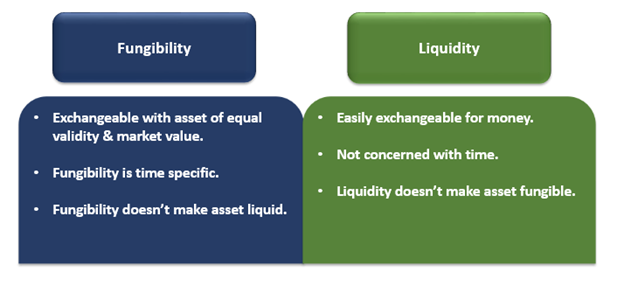What is Fungibility?
Fungibility is the quality of interchangeability of an asset. If units of an asset are indistinguishable, then it can be termed as Fungible. An entire asset class can be called fungible when each component of the asset has equal validity and value in the market. Take, for instance, a pound of copper is equivalent in value and validity to any other pound of copper. This means one pound of copper is very much interchangeable with another pound of it. Few assets classified as fungible are pure metals, commodities and cryptocurrencies. The norm of an equal exchange doesn't mean identical. The transaction must essentially happen between the same type of instruments that have a standard functionality or utility. Such transactions are also an equal exchange, and the assets can be termed fungible.
Summary
- Fungibility is a feature that ensures the interchangeability of assets in terms of utility or value. For example, securities held in the dematerialized form are fungible as they only represent a value assigned via market discovery.
- The concept of Fungibility is entirely different from Liquidity but still enables trading and investment in financial instruments.
- Assets exchanged which are equal in utility and market value can be termed fungible. It doesn't mean that the units exchanged should be the same in size and shape.
Frequently Asked Questions (FAQ)-
How is it different from Liquidity?

Source: Copyright © 2021 Kalkine Media
Fungibility may sound like Liquidity but is not the same. Liquidity essentially means easily convertible into money or its equivalent. On the other hand, Fungibility is associated with interchangeability with a substantially equivalent product with the same quality. Fungibility is also time and place restricted. Perishable products may be fungible one day, but as they lose value may not remain fungible the next day. Altered goods are another example of such goods as value is changed compared to its pure form. It is the reason why any liquid asset cannot be called Liquid; similarly, no liquid asset can be generally termed as fungible.
Take, for example, receivables are liquid assets but may not be fungible as they might not find an exchangeable equivalent in value and validity.
Does Fungibility mean different in Diverse fields?
The concept of Fungibility exists in several fields. A few of them are depicted below-

Source: Copyright © 2021 Kalkine Media
In economics, the underlying concept behind each barter transaction is the root of Fungibility. Parties in a barter would assign the same value to commodities being traded. In law, Fungibility is the concept kept in mind to assign penalties and compensations. The aggrieved needs to be compensated for the worth or utility he has been deprived of by the criminal. In international relations, Fungibility is seen when a nation exchanges its economic power or money it has to obtain other kinds of powers like military or trade.
What is a Fungible Investment?
An investment asset that can be bought or sold on multiple exchanges is termed a fungible investment. The combined effect of currency rate fluxes presents a profit opportunity for investors in such investments. Even securities held in the dematerialized form are fungible in nature.
Fungible securities allow investors and speculators to buy low and sell high to make a profit. The process is called arbitrage. In this process, buying and selling across diverse markets gives investors the needed gains. The process takes place in a market or registered exchange.
Often fungible investments are shares listed on multiple exchanges across geographies. If a company shares on various exchanges like the Australian Stock Exchange and the New York Stock Exchange and represents the same ownership interest, they will be called fungible.
The ability to purchase or sell the same financial instrument across various markets denotes Fungibility for traders in the Investment markets.
Importance of Fungibility in Investments & Assets?
- Arbitrage in trade is achieved using Fungible financial instruments.
- Provides an opportunity for arbitragers to benefit from price differentials.
- Enables crypto trading as cryptocurrencies are often fungible assets.
- Provides cross-market exposure to traders and investors.
- It Empowers foreign investor participation on various exchanges around the globe.
- It Supports cross-market trades and investor diversification for such assets.
- It Simplifies trading activities for the specific asset class, like gold, oil, etc.
- Reliability of a currency is strengthened by its Fungibility.
How does Fungibility enable Cryptocurrency trading?
Cryptocurrencies are primarily fungible, meaning investors/holders can exchange them for an equal value. Millions of everyday transactions and trades in cryptocurrencies take place due to this fact. Although there is a lot of price volatility in this asset class, one unit of any cryptocurrency would not differ in utility from another, making it fungible. Every unit is identical for most cryptocurrencies.
Cryptocurrencies are gaining investor attention because of the robust technology and use of open-source blockchain technology. It allows developers and crypto miners to keep track of any significant alterations. It utilizes the power of advanced computing programs and protocols, making it very reliable and fungible.
The computer-enabled supreme Fungibility of cryptocurrencies attracts people towards it. Fungibility enhances the faith and trust in this asset class. Though it has not replaced fiat currency still, investors' confidence is the cause of cry for its mainstream use as a unit of exchange.
If cryptocurrencies replace government-issued fiat currencies in future, it would mean a shift of financial power from governments to capitalists. Governments would lose the ability to print money and influence trades. However, many people around the world are willing to shift to it for their daily transactions. Since cryptocurrencies are rare, portable, durable and fungible, they are rising in widespread use.
 Please wait processing your request...
Please wait processing your request...